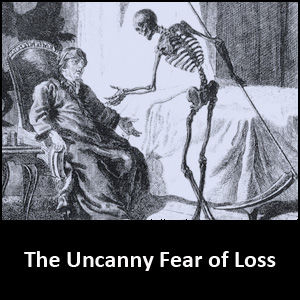Fear
The Uncanny Fear of Loss, Part 1
Part 1: Losing the unthinkable.
Posted April 14, 2018 Reviewed by Jessica Schrader
Let me ask you a question. What are you most afraid of losing? Are you afraid of dying more than anything? Or is it something else? What is that one thing you can’t imagine losing? Is it your wife? Your husband? Your only child? Are you ever afraid no one will remember you after you’re gone? In this brief post and a series of upcoming posts, I will share with you what I discovered while I was researching my dissertation. You can write me back and share what you would have concluded if you were me. This week, we will explore the irrational fear of loss. Because someday, all of us will lose everything we love.

The Irrational Fear of Loss
A key principle that stood out from my research was the finding that our species is worried about weird things. We worry about losing things all of us are going to lose anyway. We are so worried about losing them, we would do absolutely anything to avoid losing them. In fact, we would sacrifice everything we love—if necessary—just to avoid the thought of ‘losing everything we love’ (Meinecke, 2017). Is that rational? The ‘irrational’ fear of spiders or planes makes sense. We can avoid those and survive. But the ‘rational’ fear of death doesn’t make any sense. It’s not like we can avoid death. And when we die, whatever we were all so worried about losing will no longer be ours to worry about.
Coping with the Fear of Loss
First off, there is actually a theory about this fear of losing everything (we’ve got a theory for everything). It's called Terror Management Theory (Biernat & Danaher, 2013). In this theory, we are so fundamentally afraid of the thought of losing everything (dying), we are determined not to think about it (which makes it an even more intrusive thought). How often we think about dying (or not) is studied too (Hayes, Schimel, Ardnt, & Faucher, 2010). Curiously, trying not to notice something is usually called denial, avoidance behavior, or some other undesirable habit. Even stranger, we seem to ignore the transitory nature of Life as much as we ignore the longitudinal nature of death (preferring to safely read about it, study it, or watch movies about it—the better to prolong what we are avoiding the brevity of). Still, it’s not like we can try really hard not to die.
In any case, we worry about losing our lives anyway, and that constant conflict is like a constant concern in our periphery. Denying death is like a toddler having a tantrum when it’s time for a nap—because that newly activated mind doesn’t wanna sleep. And it’s funny that this mind (that doesn’t seem to get any older) often feels trapped in this companion body (that can’t avoid getting older). So, the human mind frequently tries to avoid this nagging mental terror by swapping physical parts in and out—using living pieces from the not-so-lucky (whose minds seem to have left their bodies prematurely). And we do this primarily to keep the ageless mind alive—even though this body (not this mind) flowers and fades like a splendor in the grass. And when at last this temple perishes, we miss it so. This is what I discovered during my dissertation, and we actually have statistics now—to study this interesting irony (Meinecke, 2017).
Mental Reverence (Dealing With Physical Loss)
Our species is remarkable for its struggle to modify natural outcomes (often with disastrous side effects). So, to avoid the constant realization that all living things must eventually die, we cling to (and intensely identify with) things that seem to survive physical death—in the hope that a part of us will go on as ‘an Idea’. But all these lovely living things we’ve loved so long and so well, cannot last forever. Either you (or everything you love) must wither first, and when one of you dies, the other will grieve (Kübler-Ross & Kessler, 2005). What you really need, then, is to fall in love with something that cannot die—like an enduring symbol of what you’ll miss when you’re gone (or what will miss you). Then you can busy yourself making darn sure that your symbol doesn't die (even if a symbol can’t really ‘die’ unless it becomes a person, so we can miss it when it leaves).
There seems a natural limit to what we can always treasure yet never lose, because what cannot be lost assumes no risks ... and so, having never worried about losing it, we can’t form continuing bonds with it after parting for the last time (Klass, 1993). More often than not though, what we were so afraid of losing was in no danger of being lost—at least not the way you and I are in constant danger of losing each other. You see, symbols don’t die, and symbols won’t miss us when we die. But people die, and people miss us when we die. Yet we are willing to sacrifice everything we love, everyone we care about, so that our mutually beloved symbols never die. But somehow, when we pause to wonder why, we remember that it’s through these beloved symbols we remembered to miss each other—not to miss the symbols of our love (Meinecke, 2017).
We used to feel an awe and simple reverence for each other's time and mortality, and for this world and all its fleeting creatures—not yet for our achievements or our imperishable reputations (Curry & Gordon, 2017; Meyer & Bergel, 2012). But nowadays we’re more concerned with mental death than physical death, and act like living things are dead long before they physically die. We’re much more worried about how people will treat us long after we’re gone, rather than how we treat each other while each of us are briefly here (Meinecke, 2017).
Irrational Attachments (Imperishable Partners)
But trying not to think about dying like it’s some kind of mental taboo (when everybody dies), is an awfully odd thing for a thinking species to do. Researchers say that people facing a terminal illness are actually more at peace with the prospect of leaving this life than many of us are (Brown, 2017). Worrying about losing an idea is more like panicking because you suddenly can’t find your cellphone—when neither of you are drowning or anything like that. Your cellphone isn’t in danger like a missing child, and it won’t be ‘mistreated’ just because you aren’t there to care for its welfare. Like a belief you hold more dear to your heart than other people, your cellphone isn’t alive, and both of you will be just fine even if you two are separated forever—so long as somebody continues to value each of you (Weller, Shackleford, Dieckmann, & Slovic, 2013).
This finding (worrying about the continuity of mental bonds instead of physical bonds) became the basis of my research. It captured my interest because most of my findings suggested we’re not actually afraid we won’t remember one other. We can do that by simply not seeing each other while we’re alive. (Then a memory of what we long to see will instantly replace the thing we miss). What I found was that, whenever we lose what we love, a memory takes its place like a phantom limb effect (Ramachandran, Rogers-Ramachandran, & Cobb, 1995). But we don’t love the memory, because we really love the living thing it stands for—just as we don't feel the phantom limb, we feel the limb we lost.
Yet even though this is what we’re most afraid to lose (this time together, not these memories of each other), we frequently spend our lives apart … just so we can afford to be together from time to time (and we end up treasuring the wish to be together instead of actually being together). Do you know this feeling? We often end up spending more time thinking of each other (or talking to each other), than we do desperately holding each other. But my belief is we have plenty of time to think of them or talk to them after our loved ones die. Right now we should just hold them, and never let go. Do you sometimes whisper things to those you wish were still here? Many of us do.
Giving Up What We Loved Most (Before We Need To)
So, although we should know better, we deliberately avoid time with those we thought we would never miss a minute of—in a fruitless struggle to keep them in our thoughts instead of our arms. Ironically, we sacrifice this brief time we had together, having reasoned that (if we see each other less) we will miss each other more. Thus, the memory of having given up what we loved most of all, becomes a symbol of our enduring affection for one another. And all the while, all we needed to do was whisper how much we treasured this time together, and assure each other softly while both were briefly here.
References
Biernat, M., & Danaher, K. (2013). Prejudice. In I. B. Weiner (Ed.), Handbook of psychology (Vol. 5, pp. 341-367). Hoboken, N.J: Wiley.
Brown, J. (2017, July 25). We fear death, but what if dying isn't as bad as we think? The Guardian. Retrieved from https://www.theguardian.com/science/blog/2017/jul/25/we-fear-death-but-….
Curry, T. J., & Gordon, K. O. (2017). Muir, Roosevelt, and Yosemite National Park as an emergent sacred symbol: An interaction ritual analysis of a camping trip. Symbolic Interaction, 40(2), 247-262. doi:10.1002/symb.279.
Hayes, J., Schimel, J., Ardnt, J., & Faucher, E. (2010). A theoretical and empirical review of the death thought accessibility concept in terror management research. Psychological Bulletin, 136(5): 699–739. doi:10.1037/a0020524.
Klass, D. (1993). Solace and immortality: Bereaved parents’ continuing bond with their children. Death Studies, 17(4), 343-368. https://doi.org/10.1080/07481189308252630.
Kübler-Ross, E., & Kessler, D. (2005). On grief and grieving. New York, NY: Scribner.
Meinecke, L. D. (2017). Neglected by assessment: Industry versus inferiority in the competition for scarce kidneys. (Doctoral dissertation). Grand Canyon University, Arizona.
Meyer, M., & Bergel, K. (2012). Reverence for life: The ethics of Albert Schweitzer for the Twenty-First Century. Syracuse, New York: Syracuse University Press.
Ramachandran, V. S., Rogers-Ramachandran, D., & Cobb, S. (1995). Touching the phantom limb. Nature, 377(6549), 489-490. doi: http://dx.doi.org/10.1038/377489a0.
Weller, J. A., Shackleford, C., Dieckmann, N., & Slovic, P. (2013). Possession attachment predicts cell phone use while driving. Health Psychology, 32(4), 379-387. http://dx.doi.org/10.1037/a0029265.




